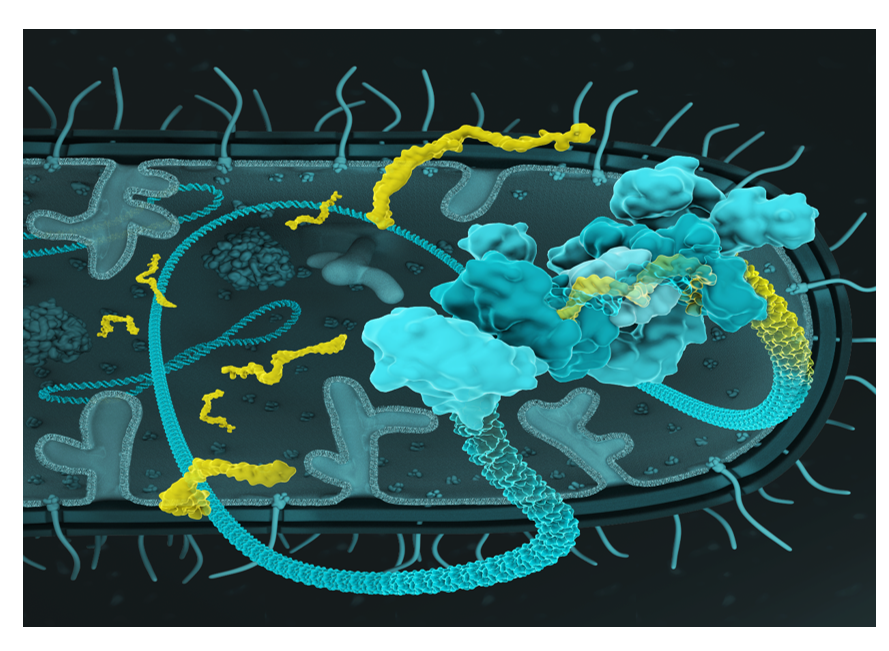May 12th 2022
A New Frontier in Diagnosing Gut Health
Every year, more than 200 million children worldwide do not reach their developmental potential. This is primarily due to infectious diseases as well as malnutrition and related disorders. Normal gut development and function are critical for determining a child’s development and health throughout life. Despite this, diagnostics that can measure the health status of the gut are severely lacking. As part of the BRCCH’s Multi-Investigator funding programme, Prof Randall Platt (ETH Zürich), Prof Andrew Macpherson (University Hospital Bern) and fellow consortium members seek to develop a non-invasive, microbe-based diagnostic that is capable of sensing and recording the status of the gut.
In a new groundbreaking study published in Science*, Prof Platt, Prof Macpherson and co-authors have achieved the first critical steps towards making this ambitious idea a reality.
Behind this work is the innovative Record-seq technology pioneered by Prof Platt in 20181. The technology is based on CRISPR-engineered bacteria that can sense and create a molecular record of changes in their surrounding environment over time. These bacteria, or ''transcriptional recorders'' can then be analysed via sequencing approaches to reveal the history of events that they encountered. This technology holds enormous potential to provide real-time information on the status of the gut environment, which could then be harnessed to guide personalised therapeutic interventions.
In this new study, the researchers first set out to understand how the transcriptional recorders behave in a real-life gut environment and what they are able to report on whilst travelling through the intestine. The team demonstrated that these bacteria survive and traverse through the gut of mice, and that they can be successfully collected from faecal samples for further analysis. Importantly, the study revealed that the transcriptional recorders are able to capture important biological information throughout all regions of the gut. This represents a major advance over current omics-based technologies that are used to study the gut, as they are unable to provide insights into intestinal regions that are more difficult to access, such as the proximal colon.

The CRISPR-engineered bacteria (or transcriptional recorders) create molecular records of information about their surrounding environment as they transit through the gut. These bacteria can then be retrieved via faecal samples and their molecular records analysed through sequencing and computational methods. Image courtesy of Prof Randall Platt
Following these exciting results, the team then embarked on testing if the transcriptional recorders can reliably report on two elements which are critical for determining gut health: nutrition and inflammation.
To do this, mice were fed with different diets and the transcriptional recorders were collected from faecal samples over time. A Record-seq analysis revealed that these bacteria record unique molecular signatures that are diet-specific and are retained by the bacteria, even following a dietary switch. Therefore, not only are these transcriptional recorders capable of reporting on the real-time dietary status in vivo, these findings also suggest that they can provide a window into the nutritional history of the gut.
The researchers then took one step further by studying the transcriptional recorders in a mouse model of gut inflammation, to mimic the local environment in the presence of gastrointestinal disease. Remarkably, the team discovered that the molecular signatures recorded by the bacteria could be used to distinguish healthy mice from those with gastrointestinal inflammation. Moreover, they could also provide a read-out for measuring the severity and biological indicators of inflammation within the gut.
Following this landmark work, we asked Prof Randall Platt about where the consortium plans to take Record-Seq from here:
''This highly collaborative and interdisciplinary project lays the groundwork towards realising the technology’s true potential for improving human health. The consortium is now focusing on translation, which primarily includes further rigorous testing in animal models of human conditions as well as ensuring robust safety and environmental containment of the genetically engineered bacteria''.
*Read the paper: https://www.science.org/doi/10.1126/science.abm6038
Schmidt F, Zimmermann J, Tanna T, Farouni R, Conway T, Macpherson AJ, Platt RJ: Noninvasive assessment of gut function using transcriptional recording sentinel cells. Science, 12 May 2022, doi: 10.1126/science.abm6038
About the researchers
Professor Randall Platt is an Associate Professor at the Department of Biosystems Science and Engineering (D-BSSE) at ETH Zürich and the Department of Chemistry at the University of Basel.
Professor Andrew Macpherson is Professor and Director of Gastroenterology at University Hospital Bern.
Professors Platt and Macpherson, together with fellow consortium members, lead the BRCCH Multi-Investigator Project: Living Microbial Diagnostics to Enable Individualised Child Health Interventions.
1 Related articles
Recording device for cell history (ETH News 03.10.2018)
Bacteria with recording function capture gut health status (ETH News 12.05.2022)